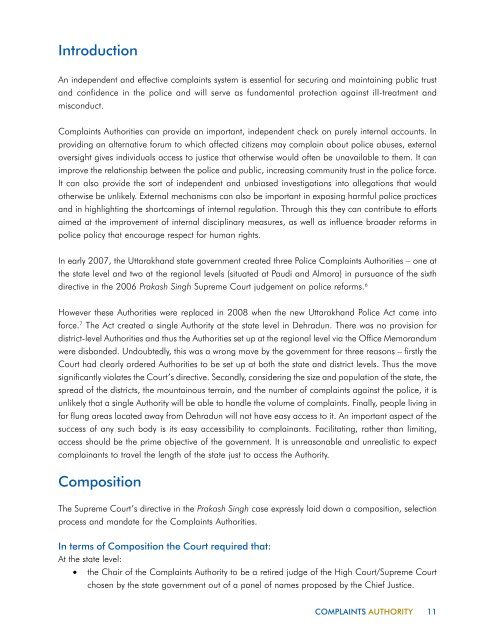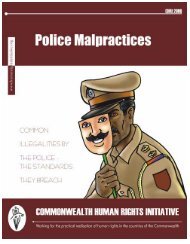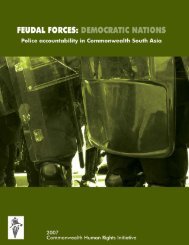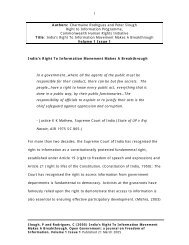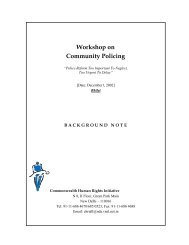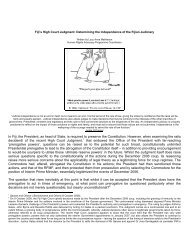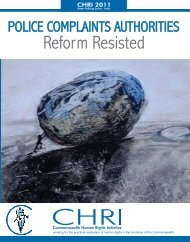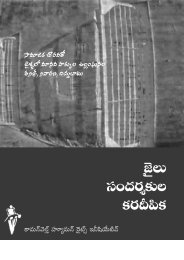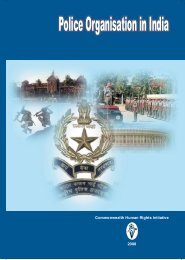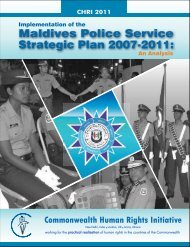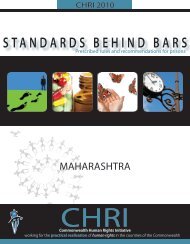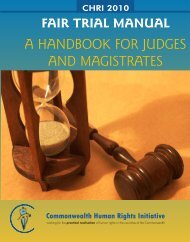Uttarakhand State Police Complaints Authority - Commonwealth ...
Uttarakhand State Police Complaints Authority - Commonwealth ...
Uttarakhand State Police Complaints Authority - Commonwealth ...
You also want an ePaper? Increase the reach of your titles
YUMPU automatically turns print PDFs into web optimized ePapers that Google loves.
IntroductionAn independent and effective complaints system is essential for securing and maintaining public trustand confidence in the police and will serve as fundamental protection against ill-treatment andmisconduct.<strong>Complaints</strong> Authorities can provide an important, independent check on purely internal accounts. Inproviding an alternative forum to which affected citizens may complain about police abuses, externaloversight gives individuals access to justice that otherwise would often be unavailable to them. It canimprove the relationship between the police and public, increasing community trust in the police force.It can also provide the sort of independent and unbiased investigations into allegations that wouldotherwise be unlikely. External mechanisms can also be important in exposing harmful police practicesand in highlighting the shortcomings of internal regulation. Through this they can contribute to effortsaimed at the improvement of internal disciplinary measures, as well as influence broader reforms inpolice policy that encourage respect for human rights.In early 2007, the <strong>Uttarakhand</strong> state government created three <strong>Police</strong> <strong>Complaints</strong> Authorities – one atthe state level and two at the regional levels (situated at Paudi and Almora) in pursuance of the sixthdirective in the 2006 Prakash Singh Supreme Court judgement on police reforms. 6However these Authorities were replaced in 2008 when the new <strong>Uttarakhand</strong> <strong>Police</strong> Act came intoforce. 7 The Act created a single <strong>Authority</strong> at the state level in Dehradun. There was no provision fordistrict-level Authorities and thus the Authorities set up at the regional level via the Office Memorandumwere disbanded. Undoubtedly, this was a wrong move by the government for three reasons – firstly theCourt had clearly ordered Authorities to be set up at both the state and district levels. Thus the movesignificantly violates the Court’s directive. Secondly, considering the size and population of the state, thespread of the districts, the mountainous terrain, and the number of complaints against the police, it isunlikely that a single <strong>Authority</strong> will be able to handle the volume of complaints. Finally, people living infar flung areas located away from Dehradun will not have easy access to it. An important aspect of thesuccess of any such body is its easy accessibility to complainants. Facilitating, rather than limiting,access should be the prime objective of the government. It is unreasonable and unrealistic to expectcomplainants to travel the length of the state just to access the <strong>Authority</strong>.CompositionThe Supreme Court’s directive in the Prakash Singh case expressly laid down a composition, selectionprocess and mandate for the <strong>Complaints</strong> Authorities.In terms of Composition the Court required that:At the state level:• the Chair of the <strong>Complaints</strong> <strong>Authority</strong> to be a retired judge of the High Court/Supreme Courtchosen by the state government out of a panel of names proposed by the Chief Justice.COMPLAINTS AUTHORITY 11


